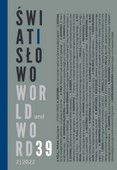Czy i jak w polskim parlamencie można "złapać języka"? Czyli o frazeologizmach z komponentem "język" oznaczających uzyskanie informacji (na podstawie Korpusu dyskursu parlamentarnego z lat 1918–2021)
Whether and how in the Polish parliament it is possible to catch a language? That is about phraseologisms with a language component that mean obtaining information (based on the Corpus of Parliamentary Discourse from 1918-2021)
Author(s): Michał SzczyszekSubject(s): Lexis, Historical Linguistics, Western Slavic Languages, Phraseology
Published by: Akademia Techniczno-Humanistyczna w Bielsku-Białej
Keywords: Catch the language; phraseology; parliamentary discourse; lexical frequency;
Summary/Abstract: That is, about phraseologisms with a "language" component that mean obtaining information (based on the Corpus of Parliamentary Discourse from 1918–2021) In the article, I analyzed 3 Polish phraseologisms – someone grabbed / captured / gained the language // caught / grabbed / got the language (ktoś złapał / schwytał / zdobył języka // złapać / schwytać / zdobyć języka); someone inquires / inquires for language // inquires / inquires for language (ktoś zasięga / zasięgnął języka // zasięgać / zasięgnąć języka); someone pulls / pulls someone’s language // pulls / pulls someone’s language (ktoś ciągnie / pociągnął za język kogoś // ciągnąć / pociągnąć kogoś za język) – functioning in the Polish parliamentary discourse. The material comes from the Corpus of parliamentary discourse (CPD) developed at the IPI PAN, containing nearly 700 million segments. I compared CPD data – in the semantic and frequency plan – with the general Polish language (based on corpuses: NKJP, Monco.pl and „Odkrywka”). It turned out that in the case of the analyzed phraseologies, as components of the secondary nomination system, the Polish parliamentary discourse does not perform a specific semantic and turnout ‘distortion’. The analyzed phraseologisms function in CPD just like in general Polish, which is a peculiar difference compared to the research on lexemes and lexical constructions in CPD.
Journal: Świat i słowo
- Issue Year: 2/2022
- Issue No: 39
- Page Range: 15-34
- Page Count: 20
- Language: Polish

